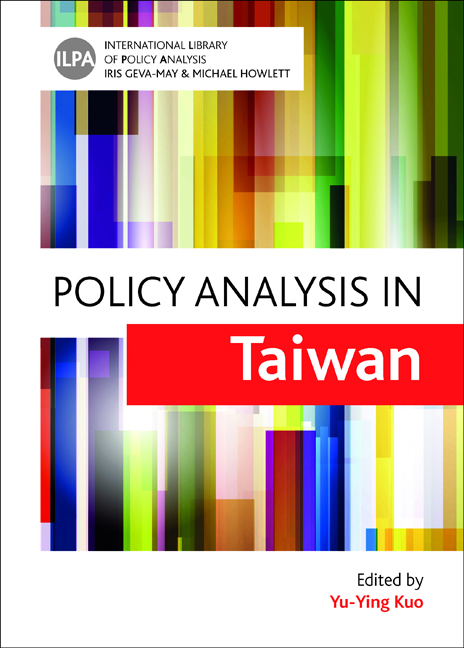Book contents
- Frontmatter
- Contents
- List of tables and figures
- Acknowledgements
- Notes on contributors
- One Policy analysis in a time of turbulence
- Two Exploring policy advisory committees in the central government
- Three Analysis of innovative local government policies in Taiwan
- Four Policy analysis in the legislative body: the legislative process of the Soil and Groundwater Pollution Remediation Act in Taiwan
- Five Policy analysis in the local councils
- Six Gendering policy analysis? The problems and pitfalls of participatory ‘gender impact assessment’
- Seven The power of influencing policies, or getting their share and more: interest groups in Taiwan
- Eight Think tanks in Taiwan
- Nine The development of public engagement in Taiwan
- Ten Social media and policy evolution in Taiwan
- Eleven Policy analysis by non-governmental organisations in Taiwan
- Twelve Policy network of universal healthcare reform in Taiwan
- Thirteen Public policy and administration research
- Fourteen Too critical to ignore? A tri-dimensional relationship examination of policy analysis internship in Taiwan
- Fifteen Policy analysis in Taiwan in an international perspective
- Sixteen Policy analysis education in Taiwan: a comparative perspective
- Index
Four - Policy analysis in the legislative body: the legislative process of the Soil and Groundwater Pollution Remediation Act in Taiwan
Published online by Cambridge University Press: 11 March 2022
- Frontmatter
- Contents
- List of tables and figures
- Acknowledgements
- Notes on contributors
- One Policy analysis in a time of turbulence
- Two Exploring policy advisory committees in the central government
- Three Analysis of innovative local government policies in Taiwan
- Four Policy analysis in the legislative body: the legislative process of the Soil and Groundwater Pollution Remediation Act in Taiwan
- Five Policy analysis in the local councils
- Six Gendering policy analysis? The problems and pitfalls of participatory ‘gender impact assessment’
- Seven The power of influencing policies, or getting their share and more: interest groups in Taiwan
- Eight Think tanks in Taiwan
- Nine The development of public engagement in Taiwan
- Ten Social media and policy evolution in Taiwan
- Eleven Policy analysis by non-governmental organisations in Taiwan
- Twelve Policy network of universal healthcare reform in Taiwan
- Thirteen Public policy and administration research
- Fourteen Too critical to ignore? A tri-dimensional relationship examination of policy analysis internship in Taiwan
- Fifteen Policy analysis in Taiwan in an international perspective
- Sixteen Policy analysis education in Taiwan: a comparative perspective
- Index
Summary
Introduction
Public policy analysis provides policy makers with important information and advice on how policy works in practice, and its political, social, economic, and environmental consequences, to help formulate policies that can improve public life. In the complex law-making process that occurs in the legislative body, policy analysis is even more important because this is the last location for reshaping a policy before it is formally implemented, and starts to affect the welfare of the public or policy target groups. Legislators need sound information and practical advice drawn from professional policy analysis to make better judgements on public budgets, policy changes, and legal approval. This chapter explores the function of policy analysis in the Legislative Yuan in Taiwan, and examines how the results of policy analysis affect the law-making process, in addition to the content of the law, taking the first and only pollution remediation law as an example.
On 12 January 1999, the Organic Law of Legislative Yuan (OLLY) had been amended for congressional reform in Taiwan, which laid the foundation for establishing policy analysis agencies dedicated to providing analytical reports to the legislator to improve the quality of the law-making process. However, we have found that in the past decade, since this congressional reform, policy analysis agencies in the Legislative Yuan do not seem to operate as expected by the OLLY. Legislators depend more on their own assistants rather than on the policy analysis agencies for information collection and policy suggestions. Through an examination of the law-making process of the Soil and Groundwater Pollution Remediation Act (SAGPRA) of 2000 and the overhaul amendment to this law in 2010, this chapter answers the following research questions: (a) Which agencies in the Legislative Yuan are responsible for policy analysis, and how do they operate? (b) To what extent do the analytical reports and suggestions provided by policy analysis agencies affect the law-making process and the content of the law? (c) What are the factors that influence the significance of policy analysis agencies in the Legislative Yuan? By answering these questions, we intend to depict a clear picture of the operation of policy analysis and explore why analytical results produced by policy analysts are underused in the legislative body.
- Type
- Chapter
- Information
- Policy Analysis in Taiwan , pp. 53 - 66Publisher: Bristol University PressPrint publication year: 2015



